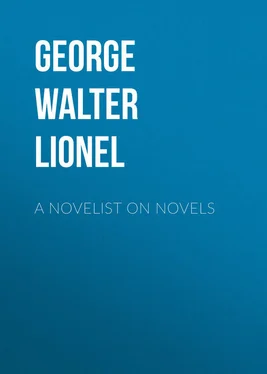Walter George - A Novelist on Novels
Здесь есть возможность читать онлайн «Walter George - A Novelist on Novels» — ознакомительный отрывок электронной книги совершенно бесплатно, а после прочтения отрывка купить полную версию. В некоторых случаях можно слушать аудио, скачать через торрент в формате fb2 и присутствует краткое содержание. Жанр: foreign_antique, foreign_prose, foreign_sf, на английском языке. Описание произведения, (предисловие) а так же отзывы посетителей доступны на портале библиотеки ЛибКат.
- Название:A Novelist on Novels
- Автор:
- Жанр:
- Год:неизвестен
- ISBN:нет данных
- Рейтинг книги:3 / 5. Голосов: 1
-
Избранное:Добавить в избранное
- Отзывы:
-
Ваша оценка:
- 60
- 1
- 2
- 3
- 4
- 5
A Novelist on Novels: краткое содержание, описание и аннотация
Предлагаем к чтению аннотацию, описание, краткое содержание или предисловие (зависит от того, что написал сам автор книги «A Novelist on Novels»). Если вы не нашли необходимую информацию о книге — напишите в комментариях, мы постараемся отыскать её.
A Novelist on Novels — читать онлайн ознакомительный отрывок
Ниже представлен текст книги, разбитый по страницам. Система сохранения места последней прочитанной страницы, позволяет с удобством читать онлайн бесплатно книгу «A Novelist on Novels», без необходимости каждый раз заново искать на чём Вы остановились. Поставьте закладку, и сможете в любой момент перейти на страницу, на которой закончили чтение.
Интервал:
Закладка:
It is because of all these people, the people who borrow and do not cherish, the people who skim, the people who indulge and cringe, and the people who do not indulge at all, that we have come to a corruption of literary taste, where the idea is abashed before the easy emotion, where religiosity expels religion, and the love passion turns to heroics or to maundering, that the success of the second-rate, of Mrs Barclay, of Miss Gene Stratton Porter, of Mr Hall Caine, has come about. It is a killing atmosphere. It is almost incomprehensible, for when the talk is of a political proposal, say, of land settlement in South Africa, or of a new type of oil engine, hardly a man will say: 'I am not interested.' He would be ashamed to say that. It would brand him as a retrograde person. Sometimes he will say: 'I do not like music,' but he will avoid that if he can, for music is an evidence of culture; he will very seldom confess that he does not care for pictures; he will confess without any hesitation that he does not care for any kind of book. He will be rather proud to think that he prefers a horse or a golf-stick. It will seldom occur to him that this literature of which some people talk so much can hold anything for him. It will not even occur to him to try, for literature is judged at Jedburgh. It hardly ever occurs to any one that literature has its technique, that introductions to it are necessary; a man will think it worth while to join a class if he wants to acquire scientific knowledge, but seldom that anything in the novel justifies his taking preliminary steps. It is not that literature repels him by its occasional aridity; it is not that he has stumbled upon classics, which, as Mr Arnold Bennett delightfully says, 'are not light women who turn to all men, but gracious ladies whom one must long woo.' Men do not think the lady worth wooing. This brings us back to an early conclusion in this chapter; novelists are not useful; we are pleasant, therefore despicable. Our novels do not instruct; all they can do is to delight or inflame. We can give a man a heart, but we cannot raise his bank interest. So our novels are not worthy of his respect because they do not come clad in the staid and reassuring gray of the text-book; they are not dull enough to gain the respect of men who can appreciate only the books that bore them, who shrink away from the women who charm them and turn to those who scrag their hair off their forehead, and bring their noses, possibly with a cloth, to a disarming state of brilliancy.
Sometimes, when the novelist thinks of all these things, he is overcome by a desperate mood, decides to give up literature and grow respectable. He thinks of becoming a grocer, or an attorney, and sometimes he wants to be the owner of a popular magazine, where he will exercise, not the disreputable function of writing, but the estimable one of casting pleasant balance sheets. Then the mood passes, and he is driven back to Flaubert's view that it is a dog's life, but the only one. He decides to live down the extraordinary trash that novelists produce. Incredible as truth may be, fiction is stranger still, and there is no limit to the intoxications of the popular novelist. Consider, indeed, the following account of six novels, taken from the reviews in the literary supplement of the Times , of 27th July, 1916. In the first, Seventeen , Mr Booth Tarkington depicts characters of an age indicated by the title, apparently concerned with life as understood at seventeen, who conduct baby talk with dogs. In the second, Blow the Man Down , by Mr Holman Day, an American financier causes his ship to run ashore, while the captain is amorously pursued by the daughter of the villainous financier, and cuts his way out through the bottom of a schooner. The Plunderers , by Mr Edwin Lefevre, is concerned with robbers in New York, whose intentions are philanthropic; we observe also Wingate's Wife , by Miss Violet Tweedale, where the heroine suffers 'an agony of apprehension,' and sees a man murdered; but all is well, as the victim happens to be the husband whom she had deserted twenty years before. There is also The Woman Who Lived Again , by Mr Lindsey Russell, where a cabinet, in office when the war breaks out, concerns itself with German spies and an ancient Eurasian, who with Eastern secrets revives a dead girl and sends her back to England to confound the spies. There is also Because It Was Written , by Princess Radziwill, where Russian and Belgian horrors are framed in between a prologue and epilogue entirely devoted to archangels. There is nothing extraordinary in these novels; they merely happen to be reviewed on the same day. The collection compares perfectly with another, in the Daily News of the 19th September, 1916, where are reviewed a novel by Miss C. M. Matheson, one by Mr Ranger Gull, and one by 'Richard Dehan.' They are the usual sort of thing. The first is characterised by Mr Garnett as 'a hash of trite images and sentimental meanderings.' Miss Matheson goes so far as to introduce a shadowy, gleaming figure, which, with hand high upraised over the characters' heads, describes the Sign of the Cross. Mr Ranger Gull introduces as a manservant one of the most celebrated burglars of the day, a peer poisoned with carbon disulphide, wireless apparatus, and the lost heir to a peerage. As for 'Richard Dehan,' it is enough to quote one of her character's remarks: 'I had drained my cup of shame to the dregs.'
This sort of thing is produced in great abundance, and has helped to bring the novel down. Unreality, extravagance, stage tears, offensive piety, ridiculous abductions and machinery, because of those we have 'lost face,' like outraged Chinamen. No wonder that people of common intelligence, who find at their friend's house drivel such as this, should look upon the novel as unworthy. It is natural, though it is unjust. The novel is a commodity, and if it seeks a wide public it must make for a low one: the speed of a fleet is that of its slowest ship; the sale of a novel is the capacity of the basest mind. Only it might be remembered that all histories are not accurate, all biographies not truthful, all economic text-books not readable. Likewise, it should be remembered, and we need quote only Mr Conrad, that novels are not defined by the worst of their kind… It is men's business to find out the best books; they search for the best wives, why not for the best novels? There are novels that one can love all one's life, and this cannot be said of every woman.
There are to-day in England about twenty men and women who write novels of a certain quality, and about as many who fail, but whose appeal is to the most intelligent. These people are trying to picture man, to describe their period, to pluck a feather from the wing of the fleeting time. They do not write about radium murders, or heroines clad in orchids and tiger skins. They strive to seize a little of the raw life in which they live. The claim is simple; even though we may produce two thousand novels a year which act upon the brain in the evening as cigarettes do after lunch, we do put forth a small number of novels which are the mirror of the day. Very few are good novels, and perhaps not one will live, but many a novel concerned with labour problems, money, freedom in love, will have danced its little dance to some purpose, will have created unrest, always better than stagnation, will have aroused controversy, anger, impelled some people, if not to change their life, at least to tolerate that others should do so. The New Machiavelli , Lord Jim , The White Peacock , The Rise of Silas Lapham , Ethan Frome , none of those are supreme books, but every one of them is a hand grenade flung at the bourgeoisie; we do not want to kill it, but we do want to wake it up.
Конец ознакомительного фрагмента.
Интервал:
Закладка:
Похожие книги на «A Novelist on Novels»
Представляем Вашему вниманию похожие книги на «A Novelist on Novels» списком для выбора. Мы отобрали схожую по названию и смыслу литературу в надежде предоставить читателям больше вариантов отыскать новые, интересные, ещё непрочитанные произведения.
Обсуждение, отзывы о книге «A Novelist on Novels» и просто собственные мнения читателей. Оставьте ваши комментарии, напишите, что Вы думаете о произведении, его смысле или главных героях. Укажите что конкретно понравилось, а что нет, и почему Вы так считаете.












